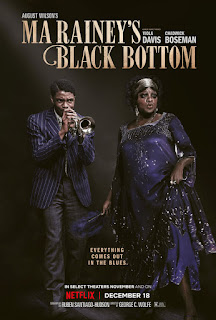"Ma Rainey's Black Bottom" an electric actor's showcase of big yet controlled performances
Ma Rainey’s Black Bottom (2020)
Some adaptations from the stage to the screen can feel stagey and stuffy. By nature, stringently confining all of the action to one space is just limiting the scope of what films are able to capture through a camera lens. In the case of “Ma Rainey’s Black Bottom”—much like another translation of a play written by August Wilson, Denzel Washington’s 2016 adaptation of “Fences”—the big performances actually lend themselves to the cinematic medium. Rather than opening up Wilson’s 1982 play in spite of just enough exteriors establishing an outside, director George C. Wolfe (2008’s “Nights in Rodanthe”) and writer Ruben Santiago-Hudson create a claustrophobia and simmering tension that are actually organic over the course of one sweltering powder keg of an afternoon fraught with unequal power and exploitation. If “Ma Rainey’s Black Bottom” is only a good motion picture, the performances are great, even dazzling.
The bare-bones story is set in Chicago, circa the 1920s, in the choked heat of a recording studio. Blues diva Ma Rainey (Viola Davis), the "Mother of the Blues" herself, is running an hour late to record her song "Black Bottom." Her band precedes her, and as pianist Toledo (Glynn Turman), trombonist Cutler (Colman Domingo), and cellist Slow Drag (Michael Potts) set up in the basement rehearsal room, horn player Levee (Chadwick Boseman) is next to arrive. A cocky, mouth-running fool who buys a flashy pair of yellow leather shoes on impulse, Levee brags to the band about how Ma is going to use his arrangement of the song. Once Ma shows up and tries standing her ground during a fender-bender right in front of the studio, Ma's white manager Irvin (Jeremy Shamos) gets a policeman to look the other way. Ma has brought along her entourage, including her newest girlfriend Dussie Mae (Taylour Paige), who doesn't help with Levee's wandering eye and flirtatious nature, and Ma's nephew Sylvester (Dusan Brown), whom she insists records the intro, despite his stutter. Things begin to heat up even more when Irvin and recording studio owner Sturdyvant (Jonny Coyne) aren't meeting Ma's demands, but she isn't about to sing until someone gets her an ice-cold Coca-Cola. Ma is keenly aware that she is being exploited for her incredible voice, but she is uncontrollable and the one with the power. As Levee dials up his recklessness, the whole recording session boils over.
“Ma Rainey’s Black Bottom” never quite shakes the feeling that one is watching a play on film, and that’s okay. The film occasionally frustrates with dips in narrative momentum, not unlike Levee's frustration in being unable to push open a symbolically locked door, but the performances here are larger-than-life yet controlled, especially by Viola Davis and Chadwick Boseman. Like Ma always calling the shots, Davis never lets you forget that this is her show. Fiery and boisterous, she is a commanding force on screen but still finds an inner life that's earthbound and world-weary. With gold teeth, make-up running, her beautiful skin glistening with sweat, and a guttural crooning voice (partially mixed with soul singer Maxayn Lewis), Davis transforms physically and vocally as the prideful, boldly demanding Ma Rainey. It’s exciting to watch Davis tear it up and even more so when she gets to go toe-to-toe with a well-matched Chadwick Boseman. Like Ma, even a braggadocio-filled hotshot like Levee hides a lot of suffering. Boseman carries himself with such a swagger and charisma, as well as an underlying pain, that gives way to Levee's volatile rage and an eventual downfall. This being the late Boseman’s final performance before his long battle with colon cancer brings even more dramatically tragic heft to his work and has one hanging on his every word.
Above all, "Ma Rainey's Black Bottom" is a red-hot actor's showcase with a fine film around it. George C. Wolfe’s direction is unobtrusive, while August Wilson’s writing remains unassailable and allows the actors to give rich voices to his written word through monologues. Wall-to-wall with storytelling, philosophizing, and shit-talking as the film is, there is such fervent power and deep emotional truth to the dialogue. When this scorching afternoon comes to a head, the end button holds such a haunting quality that suggests the future for these particular Black artists and Black artists in general. Mannered and densely loquacious yet always forthright, “Ma Rainey’s Black Bottom” offers some of the year’s most acting and the most electric acting.
Grade: B
Netflix released “Ma Rainey’s Black Bottom” (94 min.) into select theaters on November 25, 2020, followed by a streaming premiere on December 18, 2020.












Comments
Post a Comment